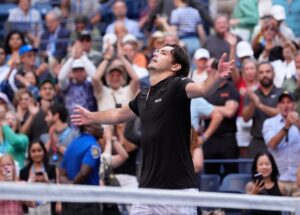For only the second time in his long Wimbledon career, Roger Federer has lost after winning the first two sets. The last time Federer suffered such a loss was back in 2011, when he faced Jo-Wilfried Tsonga, also in the quarterfinal. That day, the Frenchman’s serve was untouchable by Federer. We saw something similar happen today against South African Kevin Anderson.
Federer was seemingly untroubled in this tournament before this round. In his first four matches, he never lost a set and his serve was never even broken. Not a single one of the #1 seed’s first four matches lasted over an hour and 40 minutes. The eight-time champion looked to be cruising towards at least the final. After all, he almost never loses to the big servers on grass. With Anderson up in the quarterfinals and either John Isner or Milos Raonic in the semis, penciling Federer into the final seemed like a safe bet.
Anderson, on the other hand, did not have such an easy time getting to this point. His fourth-round match against Gael Monfils was a tight, grueling affair. The pair traded lots of breaks, and Monfils even won the third set. Similarly, Anderson lost a set against Andreas Seppi in the second round. Anderson’s career record against Federer coming into the match was 0-4. He had never won a set against the Swiss coming in; in fact, he had never even forced a tiebreak in a set. This matchup was all one-way traffic in Federer’s favor.
The Match
From the start, it looked like Federer would continue his dominance in this matchup. He was dialed in to the South African’s serve from the start, and breezed to a 6-2 first-set win. Anderson began to fight back, though, and he earned a break early in the second set–becoming the first person all tournament to break Federer’s serve. Federer quickly earned that break back, though, and the pair battled to a tiebreak to end the set. Anderson jumped out to an early 2-0 lead in the tiebreak, but he quickly lost it. He battled back after falling behind 6-3, but could not save set point on his own serve. With a two-set lead for the Swiss, this match looked to be over shortly.
Anderson had different ideas, though. He just stayed steady on serve and kept holding. We seemed heading to an inevitable tiebreak, but Anderson had different ideas. Federer played a bit of a loose game, and the tall South African pounced. When an error gave him a break point opportunity, he took full advantage. He then fell behind 0-40 in the following game as he tried to serve out the set, but he reeled off five straight points (three of them behind gutsy second serves) to take the game and the set.
The fourth set followed a similar pattern. Both players held serve for six games, but then Anderson found his opening. He opened up a break point in the seventh game and took full advantage. Two holds later, and we were going five.
Fifth Set
The final set was a tense, but not particularly stressful, one. Each player easily held, game after game. A few games reached 30-30, and Federer even forced multiple deuces (including one break point opportunity) when Anderson was serving down 3-4. He similarly forced a deuce while Anderson was serving down 5-6, but from there it was easy holds moving forward for quite a while.
This became only the third Wimbledon match in Federer’s career that went past 6-6 in the fifth set. The first two were each in the final, and both are regarded as all-time classics. The first was the 2008 final, where Federer lost to Rafael Nadal in what many call the greatest tennis match ever played. The second, a year later, was the 2009 final, where Federer defeated Andy Roddick 16-14 in the final set.
This match did not quite reach 16-14. At 11-11, Anderson received his first break point chance of the set when Federer hit a double-fault (his first double-fault of the match) at 30-30. A forehand error from the #1 seedon the next point meant that Anderson would serve for the match.
Anderson had the entire changeover to think over the upcoming fight, but he never wavered. He looked a bit tense in the first point, but he followed that up with an ace. A few points later, it was all over. In a match that lasted over four hours, Anderson had handed Federer only the third loss of his career from two sets up. The first was the aforementioned match against Tsonga, and the second was later that year, in another all-time classic against Novak Djokovic. This will certainly be remembered as a third.
Moving Forward
What does this say about Federer and his future? Honestly, not too much. The Swiss is still one of the favorites in every tournament he enters, whether it be a Major, Masters, or smaller tournament. It still takes the best day from one of the best players in the world to beat him. Remember, Anderson reached the final of the US Open last year. He is the #8 player in the world for a reason.
Federer is currently 36 years old. No one is sure how many more opportunities he will have to win more Slams. He seems determined to skip the clay season moving forward, so a French Open might be off the table. But he is still one of the absolute best in the world. It takes a great day from another great player to beat him. This may change soon as he continues to age, but for now, Federer still has to be considered a major threat in every Slam that he plays.
Anderson will face the winner of Milos Raonic and John Isner next. All three men play a similar style, so we should be in for a Wimbledon semifinal full of huge serves, big hitting, and tense tiebreaks.
Main Photo:
Embed from Getty Images






